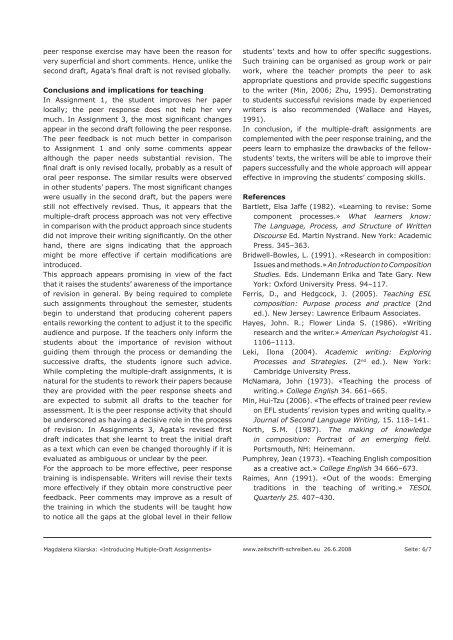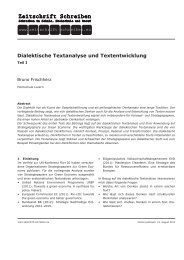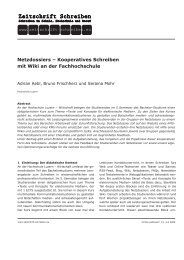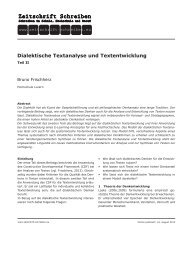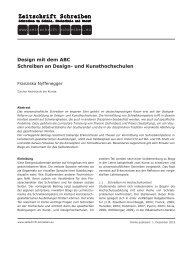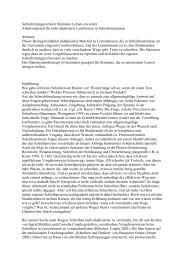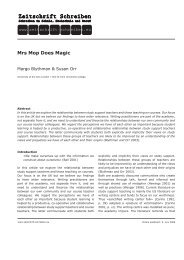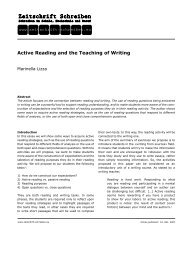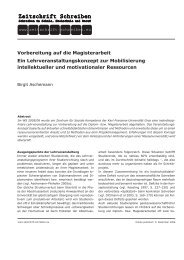Download - Zeitschrift Schreiben
Download - Zeitschrift Schreiben
Download - Zeitschrift Schreiben
Create successful ePaper yourself
Turn your PDF publications into a flip-book with our unique Google optimized e-Paper software.
peer response exercise may have been the reason for<br />
very superficial and short comments. Hence, unlike the<br />
second draft, Agata’s final draft is not revised globally.<br />
Conclusions and implications for teaching<br />
In Assignment 1, the student improves her paper<br />
locally; the peer response does not help her very<br />
much. In Assignment 3, the most significant changes<br />
appear in the second draft following the peer response.<br />
The peer feedback is not much better in comparison<br />
to Assignment 1 and only some comments appear<br />
although the paper needs substantial revision. The<br />
final draft is only revised locally, probably as a result of<br />
oral peer response. The similar results were observed<br />
in other students’ papers. The most significant changes<br />
were usually in the second draft, but the papers were<br />
still not effectively revised. Thus, it appears that the<br />
multiple-draft process approach was not very effective<br />
in comparison with the product approach since students<br />
did not improve their writing significantly. On the other<br />
hand, there are signs indicating that the approach<br />
might be more effective if certain modifications are<br />
introduced.<br />
This approach appears promising in view of the fact<br />
that it raises the students’ awareness of the importance<br />
of revision in general. By being required to complete<br />
such assignments throughout the semester, students<br />
begin to understand that producing coherent papers<br />
entails reworking the content to adjust it to the specific<br />
audience and purpose. If the teachers only inform the<br />
students about the importance of revision without<br />
guiding them through the process or demanding the<br />
successive drafts, the students ignore such advice.<br />
While completing the multiple-draft assignments, it is<br />
natural for the students to rework their papers because<br />
they are provided with the peer response sheets and<br />
are expected to submit all drafts to the teacher for<br />
assessment. It is the peer response activity that should<br />
be underscored as having a decisive role in the process<br />
of revision. In Assignments 3, Agata’s revised first<br />
draft indicates that she learnt to treat the initial draft<br />
as a text which can even be changed thoroughly if it is<br />
evaluated as ambiguous or unclear by the peer.<br />
For the approach to be more effective, peer response<br />
training is indispensable. Writers will revise their texts<br />
more effectively if they obtain more constructive peer<br />
feedback. Peer comments may improve as a result of<br />
the training in which the students will be taught how<br />
to notice all the gaps at the global level in their fellow<br />
students’ texts and how to offer specific suggestions.<br />
Such training can be organised as group work or pair<br />
work, where the teacher prompts the peer to ask<br />
appropriate questions and provide specific suggestions<br />
to the writer (Min, 2006; Zhu, 1995). Demonstrating<br />
to students successful revisions made by experienced<br />
writers is also recommended (Wallace and Hayes,<br />
1991).<br />
In conclusion, if the multiple-draft assignments are<br />
complemented with the peer response training, and the<br />
peers learn to emphasize the drawbacks of the fellowstudents’<br />
texts, the writers will be able to improve their<br />
papers successfully and the whole approach will appear<br />
effective in improving the students’ composing skills.<br />
References<br />
Bartlett, Elsa Jaffe (1982). «Learning to revise: Some<br />
component processes.» What learners know:<br />
The Language, Process, and Structure of Written<br />
Discourse Ed. Martin Nystrand. New York: Academic<br />
Press. 345–363.<br />
Bridwell-Bowles, L. (1991). «Research in composition:<br />
Issues and methods.» An Introduction to Composition<br />
Studies. Eds. Lindemann Erika and Tate Gary. New<br />
York: Oxford University Press. 94–117.<br />
Ferris, D., and Hedgcock, J. (2005). Teaching ESL<br />
composition: Purpose process and practice (2nd<br />
ed.). New Jersey: Lawrence Erlbaum Associates.<br />
Hayes, John. R.; Flower Linda S. (1986). «Writing<br />
research and the writer.» American Psychologist 41.<br />
1106–1113.<br />
Leki, Ilona (2004). Academic writing: Exploring<br />
Processes and Strategies. (2 nd ed.). New York:<br />
Cambridge University Press.<br />
McNamara, John (1973). «Teaching the process of<br />
writing.» College English 34. 661–665.<br />
Min, Hui-Tzu (2006). «The effects of trained peer review<br />
on EFL students’ revision types and writing quality.»<br />
Journal of Second Language Writing, 15. 118–141.<br />
North, S. M. (1987). The making of knowledge<br />
in composition: Portrait of an emerging field.<br />
Portsmouth, NH: Heinemann.<br />
Pumphrey, Jean (1973). «Teaching English composition<br />
as a creative act.» College English 34 666–673.<br />
Raimes, Ann (1991). «Out of the woods: Emerging<br />
traditions in the teaching of writing.» TESOL<br />
Quarterly 25. 407–430.<br />
Magdalena Kilarska: «Introducing Multiple-Draft Assignments» www.zeitschrift-schreiben.eu 26.6.2008 Seite: 6/7


